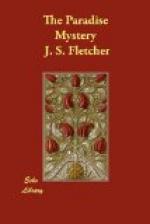The news had spread through the heart of the city, and at the police-station doors a crowd had gathered. Just inside two or three principal citizens were talking to the Superintendent —amongst them was Mr. Stephen Folliot, the stepfather of young Bonham—a big, heavy-faced man who had been a resident in the Close for some years, was known to be of great wealth, and had a reputation as a grower of rare roses. He was telling the Superintendent something—and the Superintendent beckoned to Mitchington.
“Mr. Folliot says he saw this gentleman in the Cathedral,” he said. “Can’t have been so very long before the accident happened, Mr. Folliot, from what you say.”
“As near as I can reckon, it would be five minutes to ten,” answered Mr. Folliot. “I put it at that because I’d gone in for the morning service, which is at ten. I saw him go up the inside stair to the clerestory gallery—he was looking about him. Five minutes to ten—and it must have happened immediately afterwards.”
Bryce heard this and turned away, making a calculation for himself. It had been on the stroke of ten when he saw Ransford hurrying out of the west porch. There was a stairway from the gallery down to that west porch. What, then, was the inference? But for the moment he drew none—instead, he went home to his rooms in Friary Lane, and shutting himself up, drew from his pocket the scrap of paper he had taken from the dead man.
CHAPTER V
THE SCRAP OF PAPER
When Bryce, in his locked room, drew that bit of paper from his pocket, it was with the conviction that in it he held a clue to the secret of the morning’s adventure. He had only taken a mere glance at it as he withdrew it from the dead man’s purse, but he had seen enough of what was written on it to make him certain that it was a document—if such a mere fragment could be called a document—of no ordinary importance. And now he unfolded and laid it flat on his table and looked at it carefully, asking himself what was the real meaning of what he saw.
There was not much to see. The scrap of paper itself was evidently a quarter of a leaf of old-fashioned, stoutish notepaper, somewhat yellow with age, and bearing evidence of having been folded and kept flat in the dead man’s purse for some time—the creases were well-defined, the edges were worn and slightly stained by long rubbing against the leather. And in its centre were a few words, or, rather abbreviations of words, in Latin, and some figures:
In
Para. Wrycestr. juxt. tumb.
Ric.
Jenk. ex cap. xxiii. xv.




